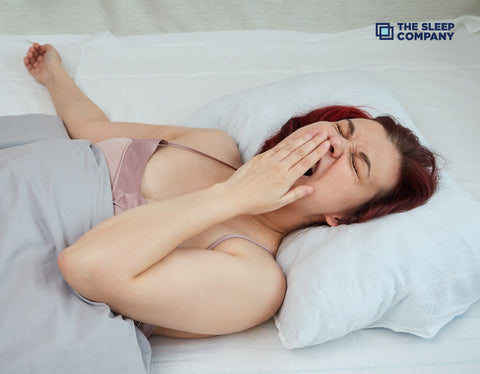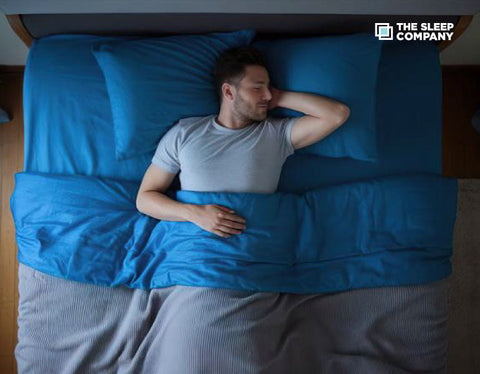My Cart

How Eating Sugar Before Bed Affects Your Sleep

Do you have a sweet tooth and frequently have an additional plate of dessert after dinner? Furthermore, do you ever have difficulties sleeping after eating sweets, even if you’ve been sleeping on the best mattress for more than an hour? Well, if yes, then you are not the only one.
Sugar is an essential part of life. It is a crucial ingredient in cakes, cookies, pastries, and other sweets that we consume every day. However, it also has its adverse effects on your health and mood. It has been shown that sugar before bed can lead to sleep problems. It also leads to increased weight and drowsiness in the morning.
In this post, we’ll look at how a high-sugar diet before hitting the mattress can impact your sleep in the long run.
What Does Sugar Do to Your Body When You Eat It?

Sugar is often considered an innocent food because it’s not thought of as harmful, and it doesn’t have any added ingredients that can cause harm to your body. Sugars in meals are metabolized into glucose and fructose, which the body may absorb. Sugar enters the blood system and is swiftly transformed into glucose, which is then utilized for energy production. It can lead to an increased risk of diabetes and other health issues related to high blood sugar levels.
Furthermore, sugar is a carbohydrate that can be present naturally in the food or added while cooking or processing. It has been related to a variety of health issues, including cardiovascular disease and obesity.
However, it also has another significant consequence, and that is it impedes your sleep in such a manner that your lack of sleep leaves you yearning for more sweets.
How Does Eating Sugar Before Bed Affect the Quality of Your Sleep?
According to studies, those who consume a high-sugar diet sleep less soundly and are more agitated at night.
1. Sleep Deprivation
The sugar that you consume during the day is stored in your liver and muscles. It means that when you wake up, your body will be full of sugar, and it will take a long time for the liver to break down this stored sugar so that your blood can circulate properly again. Therefore, many people who are sleep-deprived end up having a hard time getting back to sleep after eating a lot of sugar.
2. Overstimulation
Too much sugar late at night might be harmful to our health. When you consume sugar, your blood sugar concentrations increase and your pancreas produces insulin, which aids in the transportation of sugar straight into the cells, providing fuel to enable them to function. Consuming sugar, especially at night, causes overstimulation. It provides you with energy and prepares you for actions, but that’s not what is good for us at night. We are wired to turn off towards the end of each day.
3. Impaired slow-wave sleep
Low fiber intake, as well as excessive saturated fat and sugar consumption, is related to lighter, less restorative sleep and more wakefulness. In different terms, persons who consume more sugar spend significantly fewer hours in profound, slow-wave sleep, which is critical for the relaxation and recovery of the body, mind, and psyche.
Slow-wave sleep has always been crucial for adequate sleep. Slow-wave sleep is also essential for maintaining regular metabolic activity and a healthy immune system, which are often damaged when excessive amounts of sugar is eaten. To be honest, sugar is not a friend of a good night’s sleep.
4. Causes insomnia
Poor sleep has been connected to an upsurge in our appetite hormone ghrelin and our anxiety hormone cortisol, both of which are linked to a rise in our craving for sugary snacks. Basically, we all know that when we feel exhausted, we’re more inclined to seek for beverages or foods that will offer us an immediate boost of energy rather than hitting the mattress for a good night’s sleep. And the majority of these options are heavy in sugar. But sugar leads to sleeplessness.
So, if lack of sleep causes more sugar consumption, then higher sugar consumption leads to insomnia, which could turn into an unfortunate loop.
What Foods Contain Sugars?
Sugars are a natural part of our diet, but some foods can have more than the recommended daily limit. There are many ways to avoid overdoing it with sugars before bedtime and make sure that your body is receiving the nourishment it requires.
The most common sugars found in food items are fructose and glucose. Fruits, honey, and high-fructose syrup all contain fructose. Glucose is found in foods like slices of bread, potatoes, and fruit juices. It’s critical to keep track of the amount of sugar you eat so you don’t overdo it before hitting the mattress.
Some people believe that white sugar is better for their health than other types of sweeteners because they contain fewer calories. Other research, however, indicates that white sugar has the same detrimental repercussions on health as high-fructose corn syrup or artificial sweeteners like saccharin or aspartame .
Sugars are natural and healthy for our bodies, but it is vital that we consume the right amount of them. You should not overdo it before bedtime because a study found that eating too many sweets can lead to insomnia.
5 Ways to Avoid the Negative Effects of Sugar from Happening in Your Sleep
The sugar crash is the feeling of intense energy loss that happens when you eat a high-sugar diet. It can lead to cognitive impairment, mood swings, and over-eating.
If you’re struggling to avoid eating sugar before bedtime, try these five tips for breaking the habit.

1. Keep a food diary: For a few weeks, document all things you eat and drink throughout the day. It can assist you in determining your stimuli and the amount of sugar you’re actually eating.
2. Establish a “Sugar-Free Zone” in which no sugar is allowed: It could be your private room, workplace, or even simply the kitchen counter. Even if it seems complicated, avoid all sources of added sugars, including artificial sweeteners. You can avoid buying ready-to-eat food products and start cooking your own food. For an indulgence, consider replacing sugar with other natural sweeteners like sweet tulsi leaf for a few days.
3. Make a list of healthful sugar substitutes: These might contain veggies or fruits chopped into little pieces in order to be eaten in one session, such as figs, dates, and bananas or carrots, and sweet potatoes.
4. Drink water before going to bed: It will keep your body hydrated and reduce midnight cravings for sugary drinks like soda or juice, which can contribute to weight gaining and more health issues.
5. Avoid drinking alcohol after 7 p.m.: Alcohol inhibits your body’s capacity to create the hormone ghrelin. Ghrelin is a hormone that notifies your brain you’re hungry and produces a chemical that causes you to appear full. If you drink after 7 p.m., your body will have a more challenging time signaling you when to stop eating and start digesting the alcohol, which can contribute to weight gain, impaired focus, and hangovers.
5 Steps to Develop Healthy Habits for Better Sleep

It is essential to have a healthy sleep routine. It helps to avoid stress, improves your mood, and gives you more energy.
1. Create a sleep routine: A sleep routine helps you keep organized and complete the required hours of sleep for better health. It includes your bed routine, sleep and wake time, and total sleep hours.
2. Keep to a schedule: Once the routine is established, ensure to stick to it to the T all around the year despite holidays or weekends. Any hindrance in the sleep schedule can result in a never-ending cycle of sleep problems and health issues.
3. Find ways to relax your mind and body before bedtime: For better sleep, you need your mind relaxed. Ensure to add mindfulness and relaxation therapy to your pre-bed routines for better sleep.
4. Avoid Screen time 1 hour before bedtime: Blue light emitted from mobiles and laptops causes overstimulation in the brain. Avoid using electronic gadgets at least 30 minutes to 1 hour before sleeping. Also, prohibit the usage of gadgets on your mattress all together for better results.
5. Create an ideal bedroom environment: Make sure your bedroom is relaxing. You can do it by turning off the lights and any screens, dimming the lights or creating a peaceful scene with candles or music. Also, buy mattresses online if your old mattress is causing sleepless nights.
Conclusion:
Sugar is a highly addictive substance. It has a negative effect on our health, sleep quality, and mood. We should try to avoid it before bed is over so we can get the rest we need for the next day.
FAQs
Eating sugar before bed can spike blood sugar levels, causing a burst of energy. This makes it harder to relax and fall asleep. It may also reduce deep sleep, leaving you feeling tired the next morning.
Yes. Sugar increases alertness by raising cortisol and adrenaline levels, which can delay sleep onset. Consistently eating sugary foods at night can contribute to insomnia symptoms over time.
High sugar intake has been linked to lighter, more fragmented sleep. It reduces the amount of slow-wave (deep) sleep your body gets, which is crucial for physical recovery and memory consolidation.
It’s best to avoid sugary foods and drinks at least 2–3 hours before bedtime. This allows your body to stabilize blood sugar levels and prepares it for restful sleep.
Yes. Sugar can raise cortisol (the stress hormone), making you more alert at night. It may also disrupt ghrelin and leptin, the hormones that regulate hunger and satiety, leading to late-night cravings and overeating.
Sugar delays sleep onset because it boosts energy levels and triggers the release of stimulating hormones. People who consume sugar late at night often take longer to fall asleep.
Yes. Instead of sweets, try foods like a handful of nuts, a banana, or warm milk. These options stabilize blood sugar and even promote better sleep.





























































